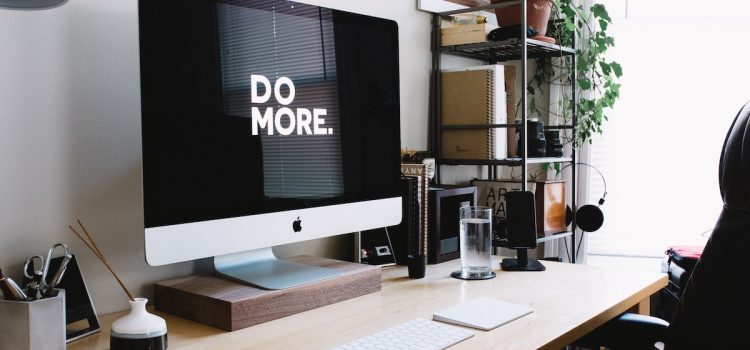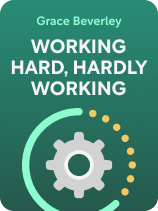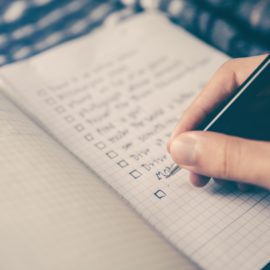

This article is an excerpt from the Shortform book guide to "Working Hard, Hardly Working" by Grace Beverley. Shortform has the world's best summaries and analyses of books you should be reading.
Like this article? Sign up for a free trial here.
If you could get more work done in less time, how would you spend the time you free up? What if you took breaks only when you needed to and not just when you wanted to?
Grace Beverley asserts that productive work leaves you with more time for self-care, and self-care boosts your productivity by energizing you. She shares three ways to improve your efficiency: use the Eisenhower Method, engage in deep work, and take a break when you truly need to.
Read more to learn how to be more efficient at work with Beverley’s tips.
How to Be More Efficient at Work
Making time for self-care is possible only if you use your work time productively. When you work effectively and efficiently, you can work fewer hours, leaving more time for self-care.
(Shortform note: Beverley’s assertion that you can make time for more self-care by working productively applies only to a subset of workers—those who have control over how many hours they work, such as CEOs and some freelance workers. Celeste Headlee points out in Do Nothing that some workers don’t have the luxury of choosing to work less. For example, those required to work a minimum of eight hours a day and those who need to work overtime to make ends meet may be unable to increase their self-care time by following Beverley’s tips.)
Let’s explore Beverley’s advice for how to be more efficient at work.
#1: Ditch the To-Do List for the Eisenhower Method
A conventional to-do list includes a lineup of tasks you must complete, whether they’re in order of importance or not. Beverley argues that to-do lists aren’t conducive to productivity because they fail to prioritize tasks. For instance, they might place unimportant tasks or tasks with far-off deadlines higher on the list than tasks that are important and time-sensitive. As a result, you waste your time on unimportant tasks and work more hours than you need to.
Beverley recommends the Eisenhower Method (EM) as a replacement for the traditional to-do list. The EM has you assess how crucial and pressing your tasks are so you can decide which to prioritize, which to delegate to others, and which to skip. Crucial tasks are important to complete at some point to achieve your long-term goals, while pressing tasks have upcoming deadlines. To implement the EM, follow these four steps.
First, complete crucial and pressing tasks. For example, if you’re a journalist, work first on a labor-intensive article with an impending deadline.
Second, complete tasks that are crucial but not pressing. For instance, work on a large article that’s due in several weeks.
Third, assign unimportant but pressing tasks to others. This will prevent you from working extra hours to complete these tasks. For example, if you’ll be leaving for vacation soon and it would be nice (both not necessary) to put an automatic vacation responder on your email, ask your assistant to draft it and set it up.
Finally, skip tasks that are both unimportant and not pressing—doing so will cut down on how many hours you have to work, leaving more time for self-care.
#2: Engage in Deep Work
Once you’ve determined what tasks you must complete and in what order, ensure you work efficiently and effectively on those tasks by doing deep work. Beverley explains that, according to Cal Newport (Deep Work), who wrote a book about this concept, deep work is devoting focused, uninterrupted attention to a cognitively demanding task.
(Shortform note: Deep work might not only boost your productivity: Newport says this type of work brings you happiness and fulfillment. He explains that when you’re doing deep work, you’re most capable of tackling your trickiest problems (the ones that are most cognitively demanding). Because these problems often yield the largest rewards, deep work is often more rewarding than its opposite—shallow work.)
To engage in deep work, Beverley advises building long periods of work time into your schedule. She says it’s easier to engage in deep work when you focus for blocks of one to one and a half hours, with breaks in between.
(Shortform note: Newport explains in Deep Work that if you’re new to this type of work, you should begin with hour-long blocks of deep work separated by breaks. Then work up to larger durations of deep work by training your brain to focus for longer and longer periods. One way to train your brain is to build your stamina for boredom during everyday idle moments. For example, while waiting in line, resist the urge to find a source of entertainment on your phone. Increasing your tolerance for boredom boosts your ability to focus, Newport says.)
#3: Know When To Scrap Your Plans
While it’s valuable to build schedules and routines that support flow, prioritization, and deep work, Beverley provides the caveat that it’s important to recognize when your brain and body are simply incapable of productivity. These aren’t situations where you stop working simply because you want to—they’re situations when you need to stop working because you’re physically and/or mentally incapable of working productively (or even at all). For example, perhaps your partner suddenly broke up with you and you’re too sad and exhausted to work.
(Shortform note: Taking a break from working when you want to but don’t need to is an example of what psychologists call self-coddling. This is when you stay in your comfort zone, such as by avoiding work, even when it would benefit you to push yourself. According to one psychologist, self-coddling provides short-term relief, but it’s soon followed by negative feelings about yourself (such as the feeling of being stuck). By contrast, genuine self-care provides a long-term benefit: After you engage in it, you feel better about yourself, and this feeling lasts.)
In cases when you need to stop working or take a long break, Beverley urges you to be kind to yourself. Don’t shame yourself for being less capable than usual and needing to engage in necessary self-care.
(Shortform note: According to educational psychology professor and researcher Kristin Neff, being kind to yourself and refraining from self-shaming are elements of self-compassion—the practice of showing yourself the same care for your failures and pain as you’d show a loved one. Neff says that practicing self-compassion allows you to thoughtfully respond to challenges you face, expands your ability to empathize with others, and helps you appreciate positive things about yourself and others. In addition to being kind to yourself, you can practice self-compassion by 1) recognizing that suffering is a universal experience that connects you to others and 2) seeing your suffering just as it is—in other words, neither diminishing nor exaggerating it.)

———End of Preview———
Like what you just read? Read the rest of the world's best book summary and analysis of Grace Beverley's "Working Hard, Hardly Working" at Shortform.
Here's what you'll find in our full Working Hard, Hardly Working summary:
- Why self-care and productivity require one another
- How to use your work time wisely and make work tasks more enjoyable
- How regular self-care can help you prevent burnout






